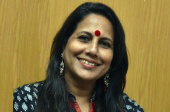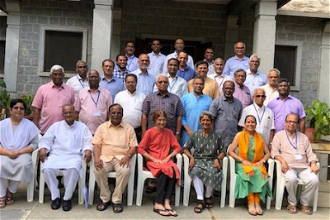Asian Viewpoint: Fundamental flaws in Synod on the Family

Dr Astrid Lobo Gajiwala
The Extraordinary Synod on the Family scheduled for October has captured the attention of the faithful like no other synod. Simply because this time the bishops will be discussing an issue on which the laity are experts.
The enthusiasm of the 'laity' is plain to see from the numbers of user-friendly surveys that have spun off from the Vatican questionnaire addressed to the bishops last October. As the Catholic Organizations for Renewal, a US-based partnership of 15 Catholic groups observed in a letter to their bishops, “individual Catholics are hungry to make their voices heard”.
However, a two-day meeting held on February 20 and 21 to discuss the Church’s pastoral approach to the family was exclusively for cardinals. One can only hope that in the run up to the synod, there will be more consultations that include representatives of families to provide inputs and insights.
My own reading of the questionnaire found two critical lacunae. As a woman functioning in an interfaith family for the past 25 years in a subcontinent where women form the anawim - or “poor ones” - vulnerable, exploited, marginalized, I felt excluded. I found no attempt to elicit information about the status of women in the family, a factor so crucial to the health of the family.
How can the family be a "domestic church" in countries like India when the birth of a girl is lamented and prevented? How can a daughter encounter Christ in the family when she is denied the same education and inheritance as her brother, and sold for a dowry? How is it possible for a mother to nurture a family when there is no food for her to eat, or her health is neglected because she is expendable?
With what integrity can one speak of responsible parenthood in a culture that makes a woman the property of her husband, to be used and abused as he pleases, bearing child after child without the resources to sustain life? What are the repercussions on a woman’s psychological and physical health when a husband demands sex irrespective of whether she wants it or not?
The chilling statistics of the Indian woman are her cry to God - a child sex ratio of 914 females to 1,000 males (the lowest since independence), which is considerably lower in many states; among the highest pregnancy-related deaths in the world; an infant mortality rate that stands at 42 deaths per 1,000 live births with one in every 22 infants in rural areas dying within one year of life; more than two-thirds of married women aged between 15 to 49 beaten, raped or forced to provide sex in marriage, a good number believing that occasional wife beating is justified and that there can never be rape within marriage. What does evangelization mean in such circumstances?
Interfaith marriages were another silent zone in the questionnaire. In India the number of interfaith marriages is increasing, ranging from more than 20 percent in Mumbai to 70 percent in certain parts of north India. The Japanese bishops cite a similar situation with 76 percent of their flock marrying people of other faiths. Unfortunately the focus of the questionnaire was on divorced Catholics and same-sex unions. I wish there had been more sensitivity to the concerns of Asia.
As I read the questionnaire sent by Rome it occurred to me that the concerns of interfaith couples are similar to those for divorced.
It needs to be said that while much is made of the Church’s openness to people of other religions, for interfaith couples the ground reality is different. In India, Catholics in interfaith marriages are made to feel that they have done something wrong. Parish priests censure the Catholic partner making it difficult to approach the Church for marriage counseling. And of course, the marriage is not a sacrament.
Sadly, there is no recognition of the interfaith family as a sign of the times and an occasion for the new evangelization. Consequently there is no care for the Catholic partner who in fact requires special support in her journey of faith. The welcome mat is out only if the children are baptized. That is a triumph for the Church and it makes me wonder, have we moved at all from our triumphant past?
Dr Astrid Lobo Gajiwala is head of the Tissue Bank at Tata Memorial Hospital in Mumbai and a lay theologian and activist
Source: UCAN
















